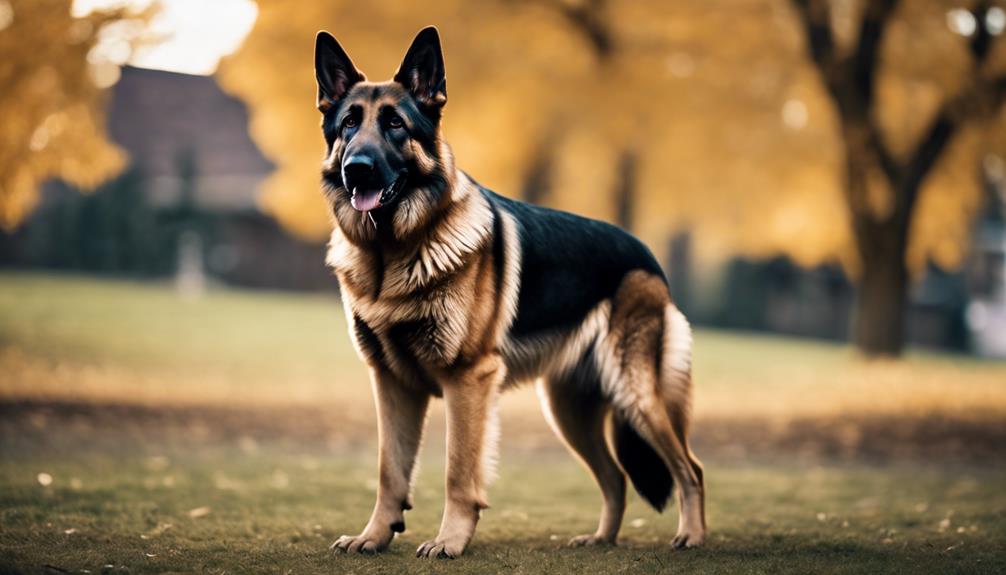🐾 Paw-some Partnership Alert! 🐾
As a pack of German Shepherd enthusiasts at MixGermanShepherd.com, we're always sniffing out the best products for our furry friends. Guess what? When you fetch something from Amazon through our links, we earn a little treat! 🦴
As you imagine a Liver German Shepherd's rich, liver-colored coat, you may wonder what makes this breed truly unique. Understanding the genetics behind this striking appearance is just the beginning; delving into the health considerations, training methods, grooming needs, and temperament of Liver German Shepherds can provide you with a comprehensive picture of this captivating breed. Whether you are considering adding one to your family or simply intrigued by their distinct qualities, exploring these aspects will offer you valuable insights into the world of Liver German Shepherds.
Key Takeaways
- Liver German Shepherds have a unique coat color due to a recessive gene mutation in the B locus gene.
- Common health concerns include Hip and Elbow Dysplasia, Degenerative Myelopathy, and Bloat.
- Positive reinforcement training methods are effective for their high intelligence and loyalty.
- Regular grooming, including brushing and bathing, is essential to maintain their double coat health.
Liver German Shepherd Coat Color Genetics
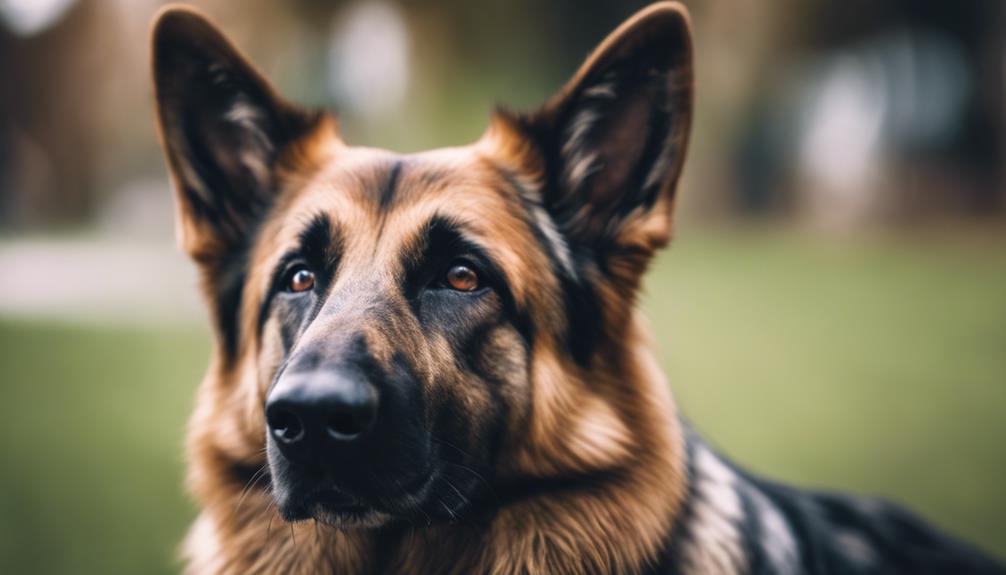
Liver German Shepherd Coat Color Genetics is determined by a recessive gene mutation in the B locus gene, resulting in the distinctive liver-colored coat seen in these dogs. This unique coloration sets Liver German Shepherds apart from the more common black and tan or sable coats found in the breed. The liver coat color can vary from a light tawny shade to deep chocolate hues, adding to the beauty and allure of these dogs.
To inherit the liver coat color, both parent dogs must carry the recessive gene for liver color. This means that not all German Shepherds will produce liver-colored offspring, making this coat color somewhat rare in the breed. When both parents carry this recessive gene, there is a chance of having liver-colored puppies, showcasing the genetic complexity behind coat color inheritance in German Shepherds.
Liver German Shepherds can display various coat combinations along with the liver hue, creating a range of stunning appearances within the breed. It's important to note that while the liver coat color is a defining characteristic of these dogs, it does not impact their temperament, intelligence, or working abilities. This genetic trait solely determines their coat color, adding a fascinating element to the diversity of the German Shepherd breed.
Health Considerations for Liver GSDs
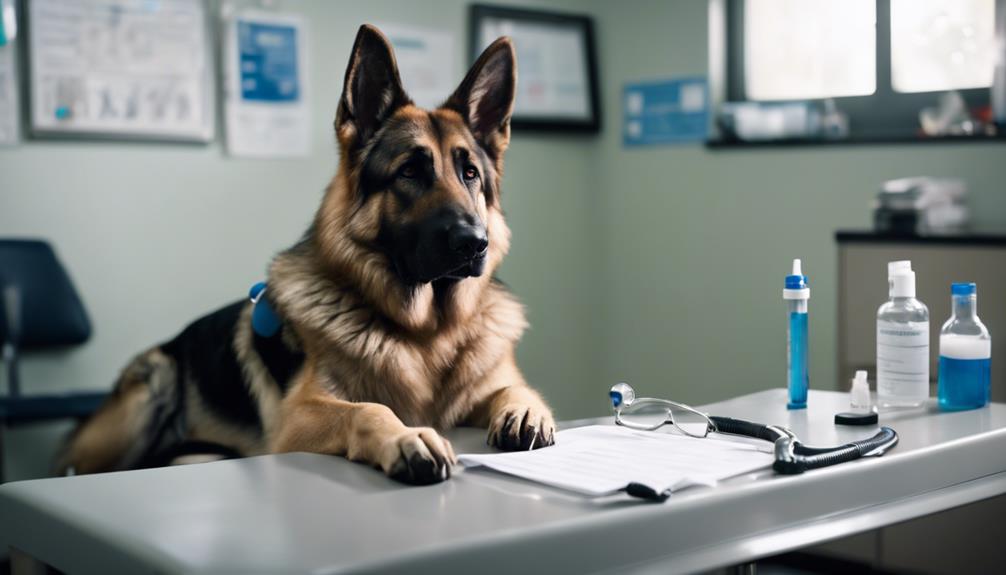
Regular veterinary check-ups are essential for managing common health concerns in Liver German Shepherds, including Hip and Elbow Dysplasia, Degenerative Myelopathy, and Bloat. Hip and Elbow Dysplasia are genetic conditions where the joints don't develop properly, leading to arthritis and lameness. Regular vet visits can help detect these issues early, allowing for interventions like joint supplements or surgery to improve your Liver GSD's quality of life. Degenerative Myelopathy is a progressive spinal cord disease that can result in hind limb weakness. While there is no cure, early detection through veterinary screenings can help manage symptoms and provide supportive care. Additionally, Bloat, or Gastric Torsion, is a serious condition where the stomach fills with gas and twists, potentially cutting off blood flow. Feeding smaller, more frequent meals and avoiding vigorous exercise after eating can reduce the risk of Bloat in your Liver GSD. Remember, proactive healthcare, including vaccinations, parasite prevention, and dental care, is crucial for keeping your Liver German Shepherd healthy and happy. By staying informed about these health considerations and working closely with your vet, you can help ensure a long and fulfilling life for your Liver German Shepherd.
Training Liver German Shepherds

Utilizing positive reinforcement methods is key to effectively training Liver German Shepherds, given their high intelligence and eagerness to work. When training your Liver German Shepherd, keep these points in mind:
- Consistent Training: Liver German Shepherds thrive on consistency. Regular training sessions not only help reinforce good behavior but also strengthen the bond between you and your dog. By establishing a consistent training routine, you can effectively teach commands and ensure they are followed promptly.
- Engage in Dog Sports: Liver German Shepherds are versatile and excel in various dog sports and activities. Engaging in activities like agility, obedience trials, or even tracking can provide mental stimulation and physical exercise for your Liver GSD. These activities also allow your dog to showcase their skills and intelligence.
- Early Socialization and Obedience: Early socialization and obedience training are crucial for shaping a well-behaved Liver German Shepherd. Exposing your dog to different environments, people, and animals from a young age can help prevent behavioral issues later on. Obedience training lays the foundation for good manners and listening skills, making your Liver GSD a well-rounded companion. By starting training early and using positive reinforcement, you can bring out the best in your Liver German Shepherd.
Grooming Needs of Liver GSDs
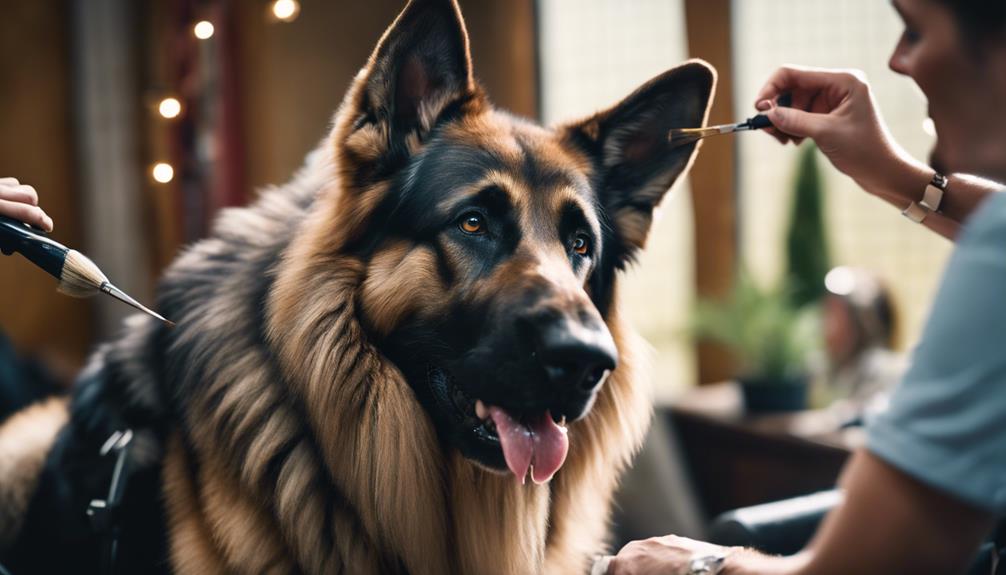
To effectively maintain the cleanliness and health of your Liver German Shepherd's coat, regular grooming practices are essential. Liver German Shepherds have a double coat that sheds year-round, requiring consistent attention to manage loose fur. Brushing their coat weekly not only helps reduce shedding but also keeps their fur clean and healthy. Bathing your Liver GSD every 2-3 months or as needed is crucial to maintain a clean coat and skin. Regular nail trimming is essential to prevent discomfort or issues with mobility in your Liver German Shepherd. Additionally, cleaning their ears regularly and checking for signs of infection can help prevent ear problems in Liver German Shepherds.
| Grooming Needs of Liver GSDs | Importance |
|---|---|
| Brushing Weekly | Reduces shedding and maintains coat health |
| Regular Bathing | Ensures a clean coat and skin |
| Nail Trimming | Prevents discomfort and mobility issues |
| Ear Cleaning | Helps prevent ear problems |
Understanding Liver German Shepherd Temperament
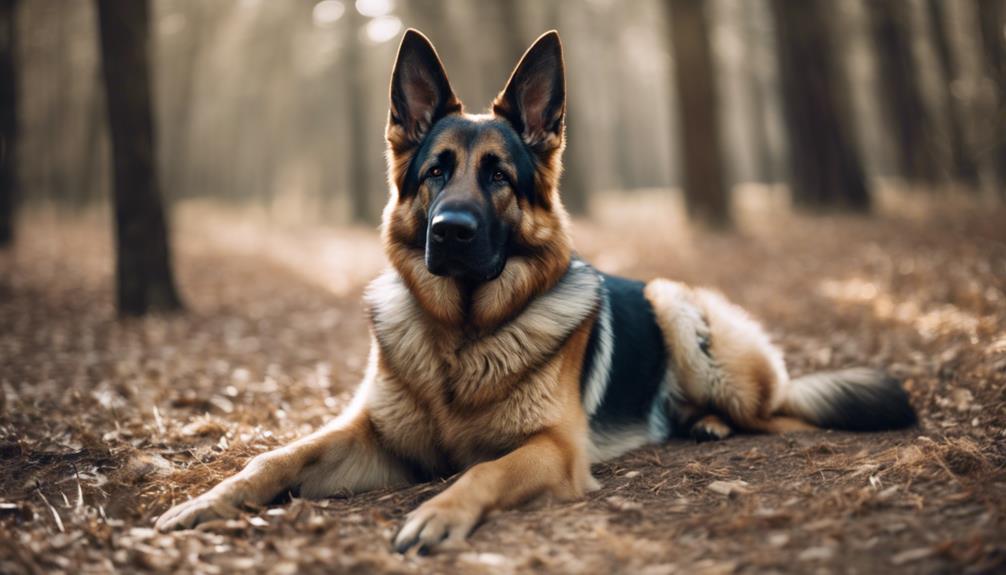
Liver German Shepherds exhibit a loyal, courageous, and protective temperament that sets them apart as versatile and devoted companions. When understanding the temperament of Liver German Shepherds, keep in mind the following:
- Loyalty: Liver German Shepherds are known for their unwavering loyalty to their families. They form strong bonds with their owners and are always eager to protect and please them. This loyalty makes them excellent guard dogs and loving companions.
- Courage: These dogs possess a courageous spirit that makes them fearless in the face of challenges. Whether it's protecting their territory or facing new situations, Liver German Shepherds show bravery and determination. This trait also makes them ideal for roles that require courage and resilience.
- Protectiveness: Liver German Shepherds have a strong protective instinct that makes them naturally guard their loved ones. While they may be reserved with strangers, they are affectionate and loyal to those they trust. Proper training and socialization are essential to ensure this protectiveness is balanced and channeled positively.
Understanding the temperament of Liver German Shepherds is key to appreciating their unique qualities as loyal, courageous, and protective companions.
Frequently Asked Questions
Are Liver German Shepherds Rare?
Liver German Shepherds are indeed a rare breed. Due to their unique liver coat color, they are less common in comparison to other standard colors. Breeding standards may not prioritize this color, and potential health concerns should be considered.
How Can You Tell a Quality German Shepherd?
To identify a quality German Shepherd, look for breed standards like body structure and coat health. Assess temperament for loyalty and obedience. Ensure health certifications. A confident, alert demeanor with intelligence and good grooming indicates a top-notch German Shepherd.
What Is the Most Expensive German Shepherd Color?
Liver German Shepherds, with their rare liver coat color, are the most expensive in the breed due to high demand and limited availability. Breeding standards, coat genetics, and breeder reputation all contribute to their pricing.
What You Need to Know About German Shepherds?
You need to know that German Shepherds require structured training sessions for obedience. Their dense double coat demands regular brushing. Watch for hip dysplasia in health checks. They crave mental stimulation and companionship for their loyal and protective temperament.
Conclusion
In conclusion, understanding the unique coat color genetics, health considerations, training needs, grooming requirements, and temperament of Liver German Shepherds is essential for potential owners. Despite their rarity, these dogs offer exceptional qualities and make wonderful companions for those who appreciate their distinctive appearance and traits. So, if you're ready to welcome a Liver GSD into your home, be prepared for a rewarding and enriching experience that will surely make your heart sing like a blast from the past.
